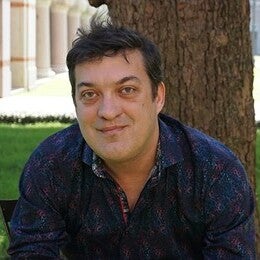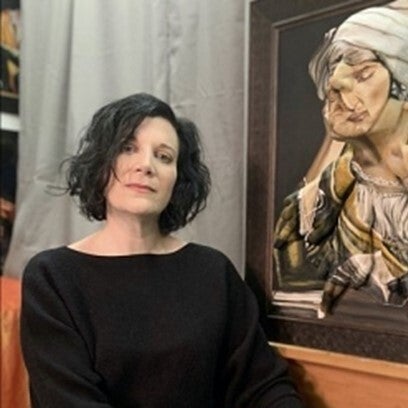About this session
What impact will Generative Artificial Intelligence have on art, artists and society? Generative Artificial Intelligence programs are now capable of producing images that bear a strong resemblance to those created by humans. These programs rely heavily on human contributions, from user prompts to computer algorithms to the vast databases of human-made artwork they draw upon to generate their output. Their widespread adoption raises a host of challenging questions including: What is art and who is an artist?
A Glasscock School educator-artist, who is experimenting with AI to create inspiration images for her oil and acrylic paintings, and a computer engineer-artist, who studies art and AI with Adobe Research, discuss the complex, rapidly evolving relationships among art, artists and generative AI. They review past technologies that have (or have not) dramatically transformed art, making, and society and consider the ethics of art generated by AI and the prospect of harnessing AI as a tool to empower artists.
Resources
- Art and the Science of Generative AI, Ziv Epstein, Aaron Hertzmann, and the Investigators of Human Creativity, Science, 15 Jun 2023, Vol 380, Issue 6650, pp. 1110-1111 DOI: 10.1126/science.adh4451
- Can Computers Create Art? Aaron Hertzmann (2018), Arts 2018, 7(2), 18; Special Issue The Machine as Artist (for the 21st Century) https://doi.org/10.3390/arts7020018
Image: Detail from “The In-Between,” Laura Spector, 2023. Acrylic painting on aluminum composite material. Concept based, in part, on generative AI inspiration images.
Aaron Hertzmann, Ph.D., Principal Scientist, Adobe Research
Laura Spector, artist and Glasscock School instructor
Friday, Sept. 8, 2023
12:00 PM CT
Live
Aaron Hertzmann, Ph.D. and Laura Spector
Presented By Aaron Hertzmann, Ph.D. and Laura Spector

Aaron Hertzmann, Ph.D. is a Principal Scientist with Adobe Research. He received a BA in computer science and art and art history from Rice University in 1996, and a Ph.D. in computer science from New York University in 2001. Dr. Hertzmann was a Professor at University of Toronto for 10 years, and has also worked at Pixar Animation Studios, University of Washington, Microsoft Research, Mitsubishi Electric Research Lab, and Interval Research Corporation. He has published over 100 papers on computer graphics, computer vision, machine learning, robotics, human-computer interaction, visual perception, and art. Dr. Hertzman is an Affiliate Professor at University of Washington, an Association for Computing Machinery Fellow, an Institute for Electrical and Electronics Engineers Fellow, and the Editor-in-Chief of Foundations and Trends in Computer Graphics and Vision.

Laura Spector is a Houston-based artist and art instructor. Her work has been exhibited nationally and internationally, most recently at The Jung Center in Houston. She is best known for her acclaimed Museum Anatomy project, which began in 1996, where she collaborated with museum curators in 16 countries, searching for hidden, stolen, lost and destroyed paintings, which she reimagines in paint, photography and sculpture. Among Spector’s honors are a fellowship from the New York Foundation for the Arts, an individual grant from Houston Arts Alliance, the Sovereign Asian Art Prize and an artist-in-residence at Atelierhaus Hilmsen, Germany. Spector was recently an artist-in-residence at the Joan Mitchell Foundation. She is teaching Painting with Artificial Intelligence at the Glasscock School this fall.
Content Disclaimer
You may not copy, reproduce, distribute, publish, display, perform, modify, create derivative works, transmit, or in any way exploit OpenRICE content without prior written permission of Rice University’s Susanne M. Glasscock School of Continuing Studies. For permission to use this content or for other media inquiries, please contact gscs@rice.edu.
You May Also Be Interested In...
Join the
OpenRice Family
Sign up to stay in the know.


